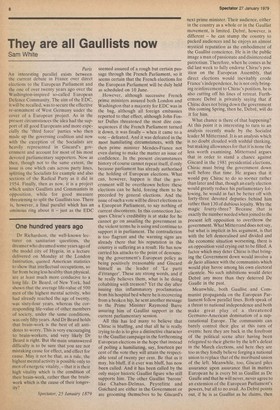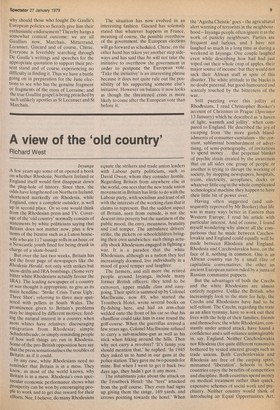They are all Gaullists now
Sam White
Paris An interesting parallel exists between the current debate in France over direct elections to the European Parliament and the one of over twenty years ago over the Washington-inspired so-called European Defence Community. The aim of the EDC, it will be recalled, was to secure the effective re-armament of West Germany under the cover of a European project. As in the present circumstances the idea had the support of all good Europeans and more especially the 'third force' parties who then made up the governing coalition and now with the exception of the Socialists are heavily represented in Giscard's government and account for most of his most devoted parliamentary supporters. Now as then, though not to the same extent, the issue is one which cuts across party lines, splitting the Socialists for example and also sections of the Radical Party as it did in 1954. Finally, then as now, it is a project which unites Gaullists and Communists in opposition, while for good measure threatening to split the Gaullists too. There is, however, a final parallel which has an ominous ring about it — just as the EDC seemed assured of a rough but certain passage through the French Parliament, so it seems certain that the French elections for the European Parliament will be duly held as scheduled on 10 June.
However, although successive French prime ministers assured both London and Washington that a majority for EDC was in the bag, although all foreign embassies reported to that effect, although John Foster Dulles threatened the most dire consequences if the French Parliament turned it down, it was finally — when it came to a vote — defeated. And it was defeated in the most humiliating circumstances, with the then prime minister Mendes-France not even daring to make the matter an issue of confidence. In the present circumstances history of course cannot repeat itself, if only because parliament has already authorised the holding of European elections. What can, however, happen is that the government will be overthrown before these elections can be held, forcing them to be preceded by general elections. And the issue of such a vote will be direct elections to a European Parliament, to say nothing of current discontents. In this connection Jacques Chirac's credibility is at stake for he cannot go on assailing the government in the violent terms he is using and continue to support it in parliament. The contradiction is too flagrant and the warning signs are already there that his reputation in the country is suffering as a result. He has now carried his attacks to the point of denouncing the government's European policy as being positively treasonable and Giscard himself as the leader of 'Le parti d'etranger'. These are strong words, and if he really believes them, what is he doing cohabiting with treason? Yet the day after issuing this inflammatory proclamation from his hospital bed where he is recovering from a broken hip, he sent another message to the Prime Minister Raymond Barre assuring him of Gaullist support in the current parliamentary session.
All this has led many to believe that Chirac is bluffing, and that all he is really trying to do is to give a distinctive character to the Gaullist campaign in the forthcoming European elections in the hope that instead of polling a humiliating, say, fourteen per cent of the vote they will attain the respectable total of twenty per cent. Be that as it may, his bluff, if it ever was bluff, has now been called. And it has been called by the only major historic Gaullist figure who still supports him. The other Gaullist 'barons' like Chaban-Delmas, Peyrefitte and Guichard are either in the Government or are grooming themselves to be Giscard's next prime minister. Their audience, either in the country as a whole or in the Gaullist movement, is limited. Debre, however, is different — he can stump the country to packed audiences and he enjoys an almost mystical reputation as the embodiment of the Gaullist conscience. He is in the public image a man of passionate and disinterested patriotism. Therefore, when he comes as he did last week to fully endorse Chirac's position on the European Assembly, that direct elections would inevitably erode France's independence, he is not only bringing reinforcement to Chirac's position, he is also cutting off his lines of retreat. Furthermore Debre is privately saying that if Chirac does not bring down the government this coming Spring, then he, Debre, will do it for him.
What chance is there of that happening? At this point it is interesting to turn to an analysis recently made by the Socialist leader M Mitterrand. It is an analysis which is no doubt clouded with wishful thinking, but making allowances for that it is none the less worth examining. Mitterrand argues that in order to stand a chance against Giscard in the 1981 presidential elections, Chirac must bring the government down well before that time. He argues that it would pay Chirac to do so sooner rather than later and that, though an early election would greatly reduce his parliamentary following, he would in fact be better off with forty-three devoted deputies behind him rather than 130 of dubious loyalty. Why the magic fourty-three? Because that is exactly the number needed when joined to the present left opposition to overthrow the government. What Mitterrand does not say, but what is implicit in his argument, is that with the left demoralised and divided and the economic situation worsening, there is an opposition void crying out to be filled. A factor which may deter Chirac is that bringing the Government down would involve a de facto alliance with the communists which would play havoc among his own electoral clientele. No such inhibitions would deter Debre any more than they deterred De Gaulle in the past.
Meanwhile, both Gaullist and Communist propaganda on the European Parliament follow parallel lines. Both speak of a threat to national independence and both make great play of a threatened Germano-American domination of a supranational Europe. The communists can barely control their glee at this turn of events: here they are back in the forefront of the political scene after having been relegated to their ghetto by the left's defeat in the March elections, and here they are too as they fondly believe forging a national union to replace that of the moribund union of the left. Meanwhile, too, Giscard piles assurance upon assurance that in matters European he is every bit as Gaullist as De Gaulle and that he will never, never agree to an extension of the European Parliament's powers, but all to no avail. As Debre points out, if he is as Gaullist as he claims, then why should those who fought De Gaulle's European policies so fiercely give him their enthusiastic endorsement? Thereby hangs a somewhat comical outcome: we are all Gaullists now, Marchais, Mitterrand, Lecanuet, Giscard and of course, Chirac. Everyone is feverishly searching through De Gaulle's writings and speeches for the appropriate quotation to support their present stand and of course experiencing no difficulty in finding it. Thus we have a battle going on in preparation for the June elections to see who has the genuine fragment or fragments of the cross of Lorraine; and the true Gaullist gospel is being preached by such unlikely apostles as St Lecanuet and St Marchais. The situation has now evolved in an interesting fashion. Giscard has solemnly stated that whatever happens in France, meaning of course, the possible overthrow of the government, the European elections will go forward as scheduled. Chirac, on the other hand has taken yet another step sideways and has said that he will not take the initiative to overthrow the government in order to postpone the European vote. 'Take the initiative' is an interesting phrase because it does not quite rule out the possibility of his supporting someone else's initiative. However on balance it now looks as though the threatened crisis is more likely to come after the European vote than before it.







































 Previous page
Previous page